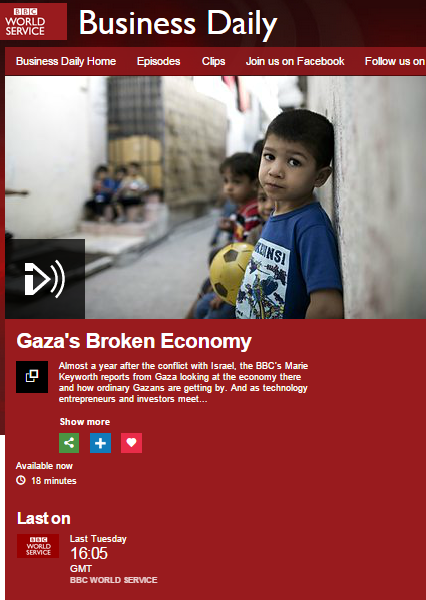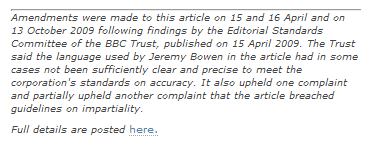As readers are aware, Roger Hearing and Marie Keyworth from the BBC’s business department recently produced a series of reports (see related articles below) for BBC World Service radio which purported to inform BBC audiences worldwide about the state of the economy in both the Palestinian Authority controlled areas of Judea & Samaria and the supposedly PA controlled – but in fact Hamas-run – Gaza Strip.
Though high on pathos and politically motivated messaging, the duo’s reports from the Gaza Strip notably made no mention whatsoever of one particular factor which has recently led to rising prices.
As the New York Times reported:
“Most recently, Hamas quietly initiated new import fees in an effort to cover the salaries of about 40,000 employees who have not been paid for months, raising prices in already-depressed markets. A kilogram of meat, a little over two pounds, increased by 50 cents, black pepper by $1.50 a kilogram and shampoo by 25 cents.”
Avi Issacharoff adds:
“The Hamas government in the Gaza Strip has instituted new taxes that will be used to pay the salaries of its administration officials, who number approximately 40,000.
Hamas, which declared the taxes under the heading “social solidarity,” decided to begin collecting them following a meeting of its parliament members who live in Gaza.
The new taxes, which include a 25 percent tariff on new cars, have led to higher prices, such as a 20% increase in the price of beef. […]
The new taxes are also constantly changing. One tax that was instituted recently requires companies registered with the Economic Affairs Ministry in Gaza to pay approximately NIS 500 to have a Hamas representative participate in a company conference. Hamas charges another few hundred shekels to have the conference registered, and if it is postponed, the postponement is taxed as well.
The most problematic taxes are levied on all goods that enter the Gaza Strip through the Kerem Shalom border crossing. Even cartons of cigarettes that are brought in from the West Bank are taxed. This means that the average resident of Gaza pays more for cigarettes than his counterpart in the West Bank does, even though the standard of living in the West Bank is higher.
Another example is meat: Since importers must pay NIS 50 in taxes for every calf that enters Gaza, the price of beef has gone up. Hamas’s import tax on sheep is “only” NIS 25 per head.”
As readers may recall, salaries for those 40,000 Hamas employees have been an issue ever since the announcement of the Hamas-Fatah ‘unity government’ a year ago. As the Times of Israel explained at the time:
“The PA has been paying monthly salaries to nearly 70,000 public servants in Gaza despite the fact that the workers had not been allowed to serve in their positions since Hamas took over the Strip by force in 2007.
On its part, Hamas has employed 40,000 of its own civil servants to work in the PA employees’ stead.”
The Palestinian Authority refused to pay Hamas’ 40,000 employees and payment of those salaries appeared among the demands laid down by Hamas as conditions for halting the conflict with Israel which it initiated last July.
Back in July 2014 the BBC’s Yolande Knell produced a dumbed down report on the economy in the Gaza Strip which misrepresented the story of those 40,000 Hamas employees and now BBC Business reporters have ignored the issue of the price rises caused by taxes intended to pay their salaries. Once again we see that factors affecting the Palestinian economy which are the result of Palestinian decisions interest the BBC considerably less than any Israeli actions.
Related Articles:
BBC Business accuracy fail on Gaza tomato exports
Mainstreaming anti-Israel rhetoric on the BBC World Service
BBC WS’s ‘Business Matters’ misrepresents the status of Area C in report on PA economy
BBC World Service’s Hearing reveals the political foundations of a ‘business’ report
Multiple breaches of BBC editorial guidelines in BBC WS’s ‘Business Matters’ report from Bethlehem




